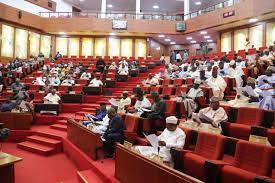Heated Debate In Senate As Bill To Ban Open Grazing Scales Second Reading
POLITICS DIGEST – A bill for an Act to ban open grazing and establish ranches as an antidote for the perennial violent clashes between sedentary farmers and nomadic herders in Nigeria, on Wednesday, scaled second reading after a slightly heated debate.
The Senate also proposed a national summit on the matter, in addition to a public hearing for a comprehensive solution.
The proposal came after a motion on the bill was moved by Senator Titus Zam representing Benue North-West, who argued, in his lead debate, that the menace of farmers and herders’ crises can easily be cured through a legislative therapy banning open grazing in Nigeria.
His argument also hinged on the need to adopt international best practices in animal husbandry by establishing a law to stop open grazing to discard the old-fashioned, hazardous and burdensome culture.
Read Also:
According to him, the bill proposes ranching as the only viable alternative for cattle breeding in Nigeria. “The bill advocates for the urgent need to transit from traditional livestock-keeping methods to modern methods which are safer and healthier for both the herds and the herders.
“The bill proposes that ranches be established in the pastoralists’ state of origin without forcing it upon other states or communities that do not have pastoralists as citizens.
“The bill further proposes that interested parties in livestock business must seek and obtain approvals of their host communities to establish ranches for peaceful co-existence.”
A portion of the bill which proposed that ranches be established in pastoralist states without forcing it in other states that do not have pastoralist communities became the subject of contention.
Despite opposition by some lawmakers including the Deputy Senate President, Barau Jibrin, who clamoured that the bill be stepped down, the majority of lawmakers gave their support when the matter was eventually put to a voice vote.
The bill was subsequently referred to the Senate Committee on Agriculture and Trade and Investment and Legal Services to report back in one month.

















